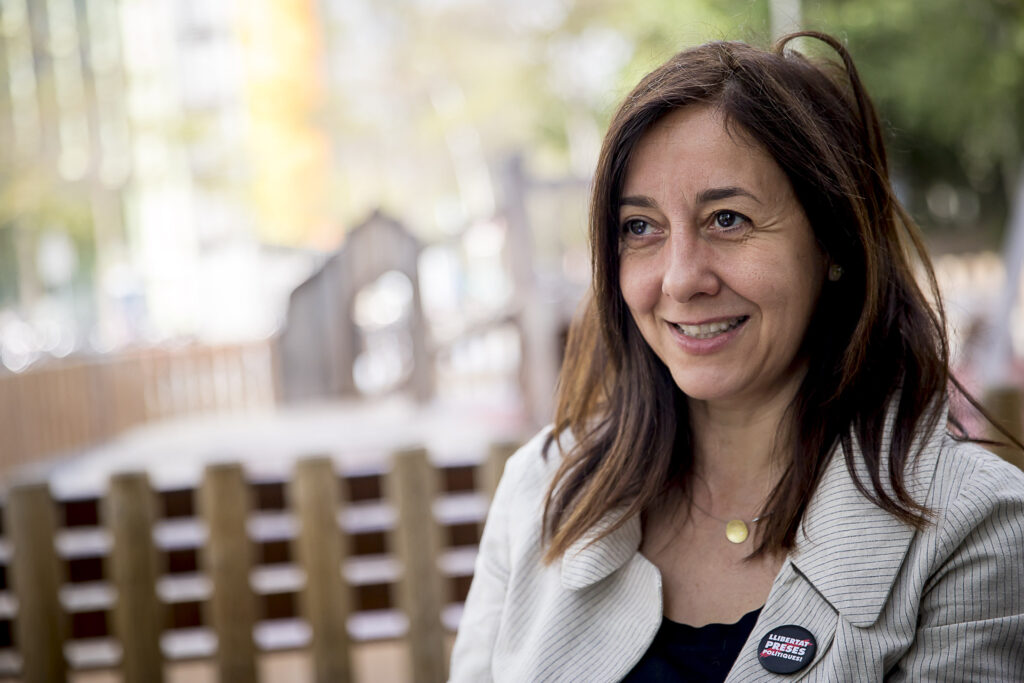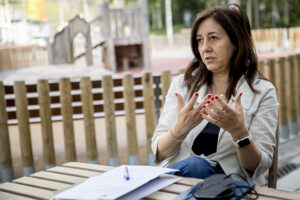29.07.2021 - 08:20
Neus Torbisco-Casals was probably the first person to add an international dimension to the efforts to combat the repression against the Catalan independence movement. Neus Torbisco is one of the leading human rights experts in Catalonia. She was in Geneva, as a visiting professor and researcher at the prestigious Graduate Institute, when she heard that Jordi Cuixart and Jordi Sànchez had been arrested. She immediately reached out to her contacts to organise a defence and an awareness-raising campaign at the UN. Her commitment has continued to this day with the Council for the Republic, as a member of the board. Neus Torbisco sees the Council as a potential space for building a consensus on independence which can be used to design a strategy for confrontation with the Spanish state.
We spoke in a café in Barcelona’s Poblenou quarter, a short walk from her children’s school, where she defended the ballot boxes on 1 October on a lightning visit from Geneva.
—Who is Neus Torbisco?
—My father came from Extremadura [in western Spain] and my mother is a Catalan. I am what they call a xarnega [a pejorative term sometimes used in Catalonia to refer to the children of mixed couples]. It is something I’ve always been proud of: I’m from a mixed family where Catalan and Spanish coexisted, but with a strong pro-Catalan leaning. I married a German from Berlin and at home we speak English, German and Catalan. I am Catalan, yes, but also very cosmopolitan and I’ve always felt that identities ought to coexist. You see, I wasn’t originally a pro-independence activist. I’ve supported independence since the Catalan Statute [was approved and subsequently watered down by Madrid]. I was a friend of PSOE leader Carme Chacón when we were students in Canada and we both dreamt of a similar future for Spain, with a model of asymmetric federalism capable of recognizing Catalonia as a nation. A state where different countries could feel comfortable and respected, able to develop their own culture. It wasn’t so long ago. What happened?
—Indeed, what happened?
—Well, in 2006 I came to the conclusion that Spain could never be like Canada and that as Catalans we couldn’t devote all our energies to convincing the Spanish that we deserve to be as free and have as much recognition for our language and culture, of our collective rights, as they have. No more, no less. The only way to be free and to be represented in the institutions is to have a state of your own. Since then, the Spanish state has done nothing but strengthen my current position. I’ve drifted far away from Spain. I’ve long since become emotionally distanced and no longer have a feeling of belonging, although I love Seville, the province of Badajoz where my father was from and also Madrid’s energy.
—When you were in Geneva, the arrest of Jordi Cuixart and Jordi Sànchez made a big impression on you.
—Yes. I was in my office that day at the Graduate Institute. I’d only been living in Geneva for two years and I always kept abreast of events in Catalonia. I was shocked when I heard, for two personal reasons: firstly, because I had close ties with the Fundació Bofill, of which Jordi Sànchez was president and whom I admired and had met on several occasions. The Fundació Bofill gave me a scholarship in the late 1990s to study in Canada, for which I’ve always been profoundly grateful, as it was a very positive experience and it had an enormous impact on my academic career. And, secondly, I have been a member of [Cuixart’s] Òmnium Cultural for many years and throughout my life I have been in contact with people from several generations who are members, especially in Igualada, where I was born.
—And you immediately launched the first international response.
—It really shook me at the time. So much so, that I cancelled an upcoming teaching appointment and, together with my husband, Nico Krisch, who is a Professor of International Law, I contacted a colleague of ours, Andrew Clapham, who’s currently serving on the UN’s Commission on Human Rights in South Sudan. He has extensive experience in serious human rights conflicts and abuses. And then we got in touch with Ben Emmerson, as we were motivated by the belief that such a highly respected lawyer would be needed in international tribunals.
—To be able to do what?
—Well, we knew that the two Jordis would undoubtedly need to appeal to these courts to obtain an international ruling which would have the effect of relegitimizing the movement for the right to self-determination. Then I got in touch with people I indirectly knew from Òmnium Cultural to help with everything I needed in Geneva. Thus began the collaboration which ended in the joint complaint to the UN Working Group and the various cases involving Spain brought before the United Nations Human Rights Committee.
—How come you realised right away that you had to follow this path?
—I’ve been working with cases involving human rights and minority rights for many years and I was also an interim lawyer at the European Court of Human Rights, and I’ve witnessed at first hand —and discuss on MA programs which I teach— many similar cases in countries that are engaged in a democratic transition or that have made incomplete transitions or that are simply failed democracies. It’s a familiar pattern. When civil society leaders are imprisoned in similar contexts, it means the state has crossed a red line, and this step is part of a strategy which invokes a paradigm of “security” in order to limit the human rights of dissident minorities.
—Many people said, ‘they won’t dare’.
—The state clearly opted for the use of force despite the cost in terms of democracy and human rights. Unfortunately, to the utter surprise of many in Catalonia (including those who stood trial themselves and their lawyers in the early stages of the court case), I was proved right. In my opinion, nothing would have changed the outcome of the judicial process or the trial in the Spanish Supreme Court. Once judges see themselves as defenders of Spain’s territorial unity backed by seemingly constitutionalist arguments, the law only serves as a justification for a sentence which has already been written. They could have had shop dummies run the defence team in the Supreme Court in Madrid and nothing would have changed.
—You mean there was no defence strategy that would have worked?
—The failed attempt at a defence gave the process an appearance of “institutional normalcy” which ultimately served to conceal the fact that the trial was a farce, designed to politically condemn the leaders of a peaceful, democratic movement which presents an existential challenge to the state. Therefore, in my opinion, the only defence that was appropriate, given the situation, was Jordi Cuixart’s. But it’s only natural that criminal lawyers as brilliant as Melero would struggle to comprehend the idea of an utter breakdown of the rule of law. The state’s reaction cannot be understood rationally and jurists tend to be rationalists.
—Were they naive?
—I think people put too much trust in criminal law, in the rule of law in general, which led them to say, “if there wasn’t any violence, how could they possibly be denied bail?” It came as a shock to their lawyers. I remember speaking to one of them, who then told me they felt as if they’d been split in two, because everything we previously knew about criminal law was no longer relevant. The state’s goal was for pro-independence parties not to govern [in Catalonia]. And the instrument to make this happen was the distortion of the law, while trying to maintain a veneer of neutrality enshrined in a theory of the division of powers which, in Spain, is a complete farce. I saw, and continue to see, a pattern consistent with that of certain political regimes in unconsolidated democracies.
—For example?
—I now lecture on and research countries such as Ethiopia and Kurdistan. In Spain, the approach is much softer, but it’s easy to identify common features. For example, the fact that the Spanish institutions acted with such force against the two Jordis, the application of the full weight of Article 155 of the Spanish constitution, freezing Catalan self-rule, and the fact that the state at no time opened the door to dialogue, even at the most critical moments, were very clear indications that, from a state perspective, all the mechanisms had been activated to deal with a state of emergency that, in fact, remains in force and will continue to do so until they achieve their intended purpose: to impose a government which is not pro-independence in Catalonia and annihilate the political and social leadership. It’s sad to say, but somehow they’re getting away with it. We know it all too well: divide and rule.
—And what did you think when you saw what had happened?
—I was horrified when I saw the patterns of human rights repression which I discuss in my classes being played out in my country. The criminal law was being used against an enemy to prevent free expression and political dissent. Many of the trials I saw while working as an interim lawyer at the European Court of Human Rights in 1998 were being replicated with startling similarities. And when I spoke to fellow lawyers and jurists at the UPF, where I’m a professor on sabbatical leave, I was surprised how people essentially denied what was going on. “It can’t be true, it would be unthinkable, Spain is in the EU, they’ll be home by Christmas.” When I hung up the phone I wanted to believe that maybe it was me who was exaggerating: maybe I was suffering from a cognitive bias due to my field of research or I was overly-anxious about what was going on. I would have loved to have been proved wrong.
—Are the Strasbourg Court and the UN all we have left?
—The only ones that can stop the Spanish judges in their tracks are the international courts and quasi-judicial entities, both regional (ECHR) and international (Human Rights Committee, Working Group on Arbitrary Detention, etc.). And standing up to this judicial policy of revenge is not only crucial to restoring the honour and dignity of those who have been directly affected by it, but also to legitimizing the defence of the collective right to self-determination. Without a correct diagnosis of the situation it’s hard to devise the appropriate legal-political strategies.
—But appeals have already been made to the international entities.
—Yes, but what was done with the UN Working Group on Arbitrary Detention should have been done much more —and collectively—, which is what we saw with Ben Emmerson and the other international lawyers. Instead, everyone went on their own to the Human Rights Court, filing appeals and more individual appeals, presumably with different factual accounts and with a lack of expertise, which can cause confusion in court and discredit our cause as a whole. We ought to keep in mind that the Strasbourg Court is inundated with cases and that it has significant leeway in terms of which cases it chooses to admit. Other entities, such as the Human Rights Committee, are mechanisms that must be used with caution because UN bodies have limited sources available to them and these organizations don’t welcome frivolous claims and the misuse of these mechanisms.
—Has the pro-independence movement misused them?
—If it what was intended was to communicate the fact that we are facing an attempt to persecute and criminalize the leaders of a legitimate political movement in favour of independence, there should be coherence and solidity which would lend integrity to all the legal demands. There were crucial ones which were not pursued and others that were superfluous or with very little chance of success that were put to the entities “to see what happens”. This approach indicates an unfortunate ignorance of international mechanisms for the protection of human rights and how to use strategic litigation to pursue legitimate political goals. There were demands made as if they were an individual complaint against the state and people who, as I mentioned earlier, think that filing a lawsuit in Strasbourg is as simple as filling in a form on the website and ticking box marked ‘human rights violation’.
—And that’s not the case?
-No at all! I’m a professor on two MA courses with students who specialize in international law and human rights for one or two years (depending on the programme); there’s a pool of expertise in criminal law and international litigation and, as in other areas of law, professionals who are recognized for their expertise. Nevertheless, in Catalonia and Spain there is still very little experience in international human rights law, when it comes to rules and jurisprudence as complex as those in other branches of the law. In addition, we have this idea, which I saw repeated in the series El judici [The Trial], on TV3, according to which there is a political defence and a model of technical defence. I haven’t seen that anywhere else.
—A political defence and a technical defence. Is that distinction not valid?
—I think it’s based on a misunderstanding. It’s one thing to say that there are political rulings when people are tried for political reasons and that democracy is incompatible with the existence of these unjust processes. It’s another thing to suggest that technical defences cannot be based on substantive arguments related to the defence of human rights. It implies that human rights aren’t enshrined in the law, and that Spanish law is not intrinsically linked to an international legal order. In reality, human rights, and the protection of these rights by the international treaties which Spain has ratified, automatically form part of our domestic law and are immediately applicable, and even prevail over internal rules which may contradict them.
—We think we can persuade the state with the tools of the state.
—The problem is we are too inward-looking, and not in the least international. When you fight for a cause, you have to explain your reasons, so that your opponent can understand you. We want to be understood in Madrid and we act as if the state should behave rationally and morally. As if this process were guided by reason, instead of force and emotions. It’s not so. And until we realise that, we will continue to come up against a brick wall which is impervious to our “reasons”. The state has its own reasons and they are obvious: they want to keep Catalonia a part of Spain in spite of the cost in terms of democracy and human rights. Its strategy is consistent with this goal and is legitimized by the incessant appeals to the Spanish constitution. With the PSOE in power nothing has changed. Only the means.
—Is it worth trying to negotiate?
—When you try to negotiate with the state, you must be very aware that any inclination to engage in a dialogue will be purely strategic and it won’t be based on principles, the product of a short-term need (like at the time of Pedro Sánchez’s election); as a result, it will be an unstable dialogue and any agreements reached will not be true commitments in a political culture that, in itself, is not particularly liberal and where many leaders are characterized by a lack of public virtues, such as the honouring of agreements.
—How can they be forced to negotiate?
—Incentives to promote a genuine desire to resolve a conflict by making significant concessions allowing for an agreed independence referendum, do not exist. They will only exist as a result of an increase in domestic and international pressure. Meanwhile, a smart confrontation with the state is required. Which is why I think that the 1 October referendum was a great victory that must be vindicated and which is unrepeatable as the culmination of a collective process of exercising democracy that dignifies us as a people. Whether it was legal or not is secondary since any revolution entails a legal breakaway and the key question is not one of legality but one of substantive legitimacy.
—Do we find it hard to opt for confrontation?
—It is partly true of us Catalans that we are too civilized to confront the Leviathan with the right weapons: we wish to create a peaceful revolution, with dialogue, with creative, spectacular demonstrations, without major upheavals, with the desire that other states and even our adversary will understand us, so that they don’t feel like we don’t respect them… And that after the upheaval no one will be left feeling angry. But very few political divorces are mutually agreed upon or completely peaceful, which is why the state continues to engage in full-on institutional violence. They realise that it’s a war and we are the enemy.
—Did we over-explain things?
—Yes, and we didn’t see where the counterweight was. It’s not in Madrid. The trial was lost because letting us win wasn’t part of the plan. On 1 October we were too close to victory and the state wants to make sure that, in spite of what my beloved Jordi Cuixart says, we won’t do it again. However, their understanding of the situation was also incorrect. The independence movement isn’t a flash in the pan: the Catalan people have shown resilience, patience and a feeling of hope which is currently absent in the political class. Needless to say, they are obviously the major target of persecution and not everyone ought to be or wants to be a hero, which is also understandable. Which is why repression works, confuses, divides us and breeds insecurity. So much so that some are willing to leave behind 1 October as part of our collective heritage and the founding moment of a new country and, instead, have begun to see the [2017 independence] referendum as a failure thanks to the harsh consequences which ensued. Nonetheless, we need to persevere and rethink our strategy and tactics.
—How?
—We must never lose sight of the fact that it is Spain which has failed by sacrificing the rule of law, democracy and human rights. If Spain were a proper state, not one led by mediocre types, they would have realised that their diagnosis of the Catalan issue ten or twelve years ago was wrong: they concluded that, either with a carrot or with a stick, the pro-independence movement would fade away in a short time.
—Did they think Catalans would eventually get it, after being at the receiving end of all their lawfare?
—Yes, and if punishment and imprisonment were necessary, we would eventually get it. And if we didn’t learn, they wouldn’t let us out of jail. It’s such a predictable approach, straight out of the handbook of repression, and not even the lawyers have understood it after having their clients locked away for two or three years… And there are still some lawyers who insist that their client isn’t a political prisoner… What world are they living in? It’s as if they thought that if reality doesn’t match their views, “reality loses out”. Well it’s not like that, mister. They all need to admit that they were wrong in weighing up the possible outcomes of the trial. The trial is a small event within a much larger war. And no war has ever been won without leadership and a collective strategy. Spain is playing its hand perfectly. It’s the politics of fear, intimidation and repression that weakens you gradually, that makes you doubt yourself, that turns you against your own camp. In this time of disinterest and internal rifts, they’ve paved the way for their objective.
—In the meantime, there’s no plan and we are at a dead end.
—Now we’ve reached a form of modus vivendi, which as I see it, makes it exceedingly difficult to form a government. The political philosopher John Rawls said that it’s one thing to have a modus vivendi to survive, in which certain rules of the game are agreed with one’s adversary in order to exist and to have some form of coordination and solve problems which inevitably require collective action. However, an overlapping consensus is needed to create a true political community. And right now we are still talking to a brick wall, we see internal debate as a threat and organizations are turning into small cults based around a single idea in order to reduce complexity. You’re either with me or you’re against me.
—How can we move on from here?
—We need to find this overlapping consensus, and it’s not so easy. You have to break through the wall that forces us to have to react to the news every day, to what happens to us, to what Spain does to us… We need to deescalate the debate, especially on social media. We need to voice our opinions with respect, and to value those who were sent to prison. We must engage in dialogue once again, most likely with the help of a professional mediator and try not to abandon a policy of truth, in recognition of 1 October, of the legitimate president we have in exile, of the members of his government who are in prison. We need all the leadership we can get. Spain has managed to ensure we have entered into an internal battle and in the meantime the repression is dragging us down. Many movements fail for such reasons.
—Should the Council for the Republic be a space in which to seek a consensus?
—I continue to support the Council for the Republic as an optimal space to create this consensus, in spite of all the reforms required in terms of how it operates. Because the Catalan government is very limited, it has to work and manage with the few resources it has at its disposal since it’s not a state, and it has to do so at a time of a serious health and welfare crisis. Which is why the leaders of the main political organizations and civil society need to operate in a protected framework, to pacify internal conflict, rethink strategies and reach agreements in a discreet way, rather than simply making partial commitments. They need to meet not only to form a government or respond to an immediate situation.
—But everyone would need to see the Council in the same way, and it’s not happening.
—I feel strongly that the Council for the Republic can offer an institutional refuge. And if it lacks legitimacy it’s because certain actors wanted it that way. In fact, President Puigdemont is one of the people most willing to make changes to the Council. He is a leader with a vision and a strong desire, someone who is thoroughly committed to continuing to fight for an end to this process in a collective manner. It’s frustrating to see an image of the Council and its President that I, as someone who has been linked to it from the very beginning, consider deeply biased. We need an inclusive space that can reflect and define strategies removed from the turmoil in order to allow for reasoned debate. Some people legitimately claim that we have failed and that we can’t [achieve independence], but they need to speak out and confront the truth openly.
—At one point it seemed as if Junts also took political advantage of the Council.
—I think the Council is a symptom of strategic differences which may not be as disabling as they seem. The Council was created as a result of a government agreement between Junts and ERC and an institution had to be created abroad, and it’s the least we can do to respect the work done by the president in exile, which has been key to shaping European public opinion, in redirecting it. We must not give up such a political asset. But as the divisions increased, they affected the Council. The cross-party support it initially enjoyed started to weaken. In this country everything is pigeonholed; we don’t discuss the facts; we discuss who says them. Everyone assumes that if you say something, it’s because you are with me or against me or because you belong to a certain institution or you don’t belong to it. This is typical of institutions which are sectarian, political parties where there are no internal disagreements. As I said, at a time such as the present, the political parties are more sectarian. And instead of opening up to dialogue with others, they think that debate makes you weaker, and you end up repeating the party line. And some say that 1 October was one thing, while others say it was something else. Meanwhile, the state keeps having a laugh.
—It’s also not been possible to explain to people what the Council for the Republic is exactly.
—It hasn’t been understood from the start since it has a very fragile infrastructure. We don’t have many resources. The Council for the Republic could only unleash its potential if people’s commitment to it were genuine, rather than artificial. If people really believed in its potential. Which is why it needs to overcome internal dynamics of confrontation which can’t be conquered in the election or post-election context. At present, the Council sees itself as an advocate of a strategy, the “let’s-get-ready” strategy. It’s neither such a radical nor an idealistic strategy; those of us who believe in the Council for the Republic think that there will inevitably be a confrontation with the state. A smart confrontation.
—What do you mean by a smart confrontation?
—It can mean many things, and it serves as a framework. Which is why we need a serious debate which includes, for example, issues such as whether it is worth having the Speaker of the House removed from office and on which fronts we need to concentrate our efforts. We need to keep in mind that resources and leaders are scarce assets. And from what I’ve learnt from quite a few conflicts, it takes years for you to rebuild your leadership. If you enter into a confrontation with the state, you mustn’t run straight into a brick wall because you don’t have a strategy. You might decide to sacrifice your life, but you need to know what for. And that’s why we need a strategy that gets us somewhere. Otherwise, with all the will in the world, people won’t be prepared to sacrifice anything. People already sacrificed a lot on 1 October 2017 and now they want to know where we’re headed. We need to be prepared for an ongoing, selective confrontation on several common fronts, we must be prepared to transform the current situation and not remain stagnant.
—But we need some milestones.
—Yes, in both the short and long term. Which is why we need the Council. Because it represents a strategy for a confrontation with the Spanish state. Some see it as being in opposition to a strategy of dialogue. And I think the two strategies can be complementary. Over the years I’ve seen similar processes in which the state will only sit down to really negotiate —not a dialogue that’s just for show— when it realises that it’s facing a very serious confrontation.
—There was already a confrontation in October 2017.
—Exactly, but we needed allies we didn’t have at the time. Europe didn’t support us. At the international level, which is something I know about, diplomatic networks are required. We’ve faced strategic disputes which lacked continuity since we don’t have a shared political strategy. If we had had one, we would already have a strategic and legal basis from which to collectively decide how we deal with these cases in the European Court of Human Rights, as to what our approach should be… We ought to have a collective strategy exercised by a group of lawyers from 1 October. If we had one, we would have gone to the UN already. We need international tools to fight, to set goals, to say, for example, that in three or five years we want the state to have thirty convictions for human rights violations, rather than one. Court rulings which reflect the image of repression that exists. We must also fight against the violation of cultural and linguistic rights in order to publicise Spain’s assimilationist policies and discrimination against Catalan in the public sphere. The Strategic Consumption campaign fits in with a “let’s be prepared” strategy.
—I thought that somehow this was already being done.
—Very little has been done. Not much priority has been given to bringing the Spanish state before an international court of law. We need resources and the will to expand.
—If there were numerous rulings against the Spanish state, would that force it to the negotiating table?
—Yes. Kurdistan is an example. In the late 1990s Turkey imprisoned many mayors, from many municipalities. And the Kurds organized themselves internally, creating a group of defence lawyers, though they didn’t have many resources. However, they were helped by international organizations of jurists, support structures were set up… And there came a time when they had dozens of very well-written applications lodged with the ECHR. At the time, Turkey wanted to join the EU, and it was required to have a clean human rights record. And the Kurdish question was very important, to the point that there were a few convictions and Turkey ended up agreeing to negotiate and release prisoners on condition that they didn’t file any more complaints with the Human Rights Court.
—The situation is different with Spain though.
—It is, but keep in mind how they reacted when confronted, especially by the exiles. Right now the Spanish state has been fractured and people can see that there are internal divisions; that people have been imprisoned for three years and yet nothing has happened. And PM Sánchez walks around Brussels without a care in the world; moreover, he’s seen as Europe’s golden boy, a left-wing feminist guy who rules with the support of the pro-independence movement. There’s a touch of Hegel’s master-slave dialectic. In other words, we make a policy based on a rationality that does not exist, which is based on the approach that if I support you, you’ll support me. I recognize you and in return you recognize me. But I think that won’t happen. We who are pro-independence must realise that we are the enemies of the state, and the state, which is very primitive in this case, will not strike a deal with its enemies.
—Not everyone in the independence movement sees it like that.
—One of the things that a general staff ought to discuss —I don’t mean the political parties or the government— at a critical time for the movement is whether a certain individual should receive our backing, or whether our support ought to be withdrawn. We should discuss it calmly, in a protected space. The Council for the Republic does not want to influence day-to-day political decisions, we already know that everyone does the best they can. But if we want to manage something better than home rule, we have to understand what’s fundamental and reach strategic agreements. Today I would venture to say that the main problem isn’t the state: it’s us.







